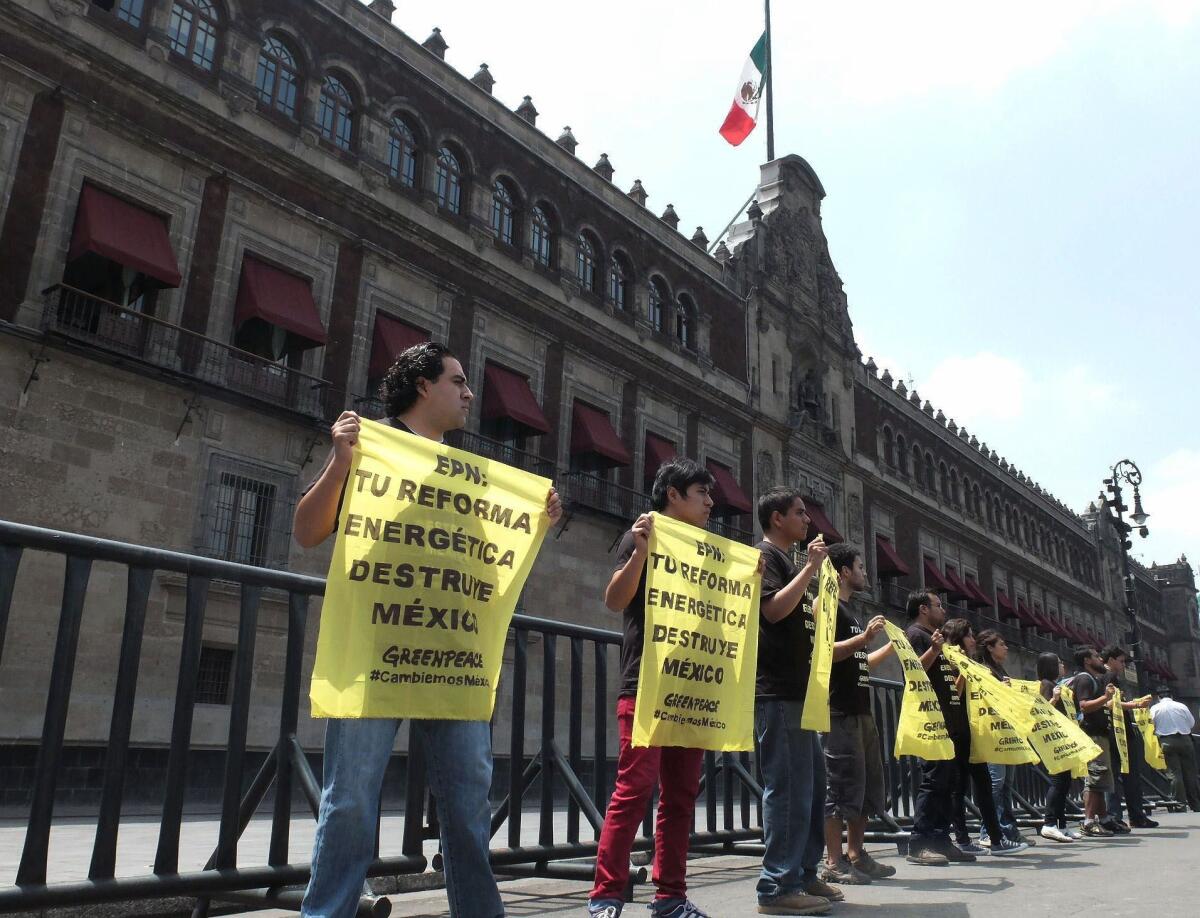Debate rages over Mexico’s plan to open energy markets

Politicians stand on the podium in the lower house of Congress, waving signs and shouting, “Viva Mexico, THIEVES!” Outside, crowds demonstrate. The sessions drag on into the wee hours until an earthquake forces everyone to evacuate.
It might be a rather typical week in the life of Mexican legislation, if it weren’t for the momentous nature of the laws that are under discussion.
As early as Thursday, a potentially revolutionary reform of Mexico’s oil, gas and electricity industry is expected to clear its final hurdle. The lower house was on the verge Wednesday of approving so-called enabling legislation that will open energy exploration and recovery to scores of foreign firms for the first time in nearly seven decades.
President Enrique Peña Nieto considers it a cornerstone of his government, a reform that will provide a critical boost to the struggling Mexican economy.
But for many critics, the laws fall short of offering the guarantees necessary to make future deals fair to Mexico. Despite the marathon sessions in Congress, few details have been revealed about exactly how the gigantic oil monopoly Petroleos de Mexico, or Pemex, has spent its money over the years and why it is now heavily in debt.
And the laws include virtually nothing to investigate, monitor or change the notoriously corrupt oil workers union, known for the lavish lifestyles of its yacht-owning leaders and the lackadaisical inefficiency of its employees.
Even California Gov. Jerry Brown, visiting Mexico this week on a trade mission, stepped into the fray, warning legislators that if they did not also enact a strict regulatory regime, foreign oil and gas companies “will eat you alive.”
In addition to the criticism, many Mexicans experience a visceral dread of relinquishing resources to transnational companies, a holdover nationalism ingrained in Mexican generations since the revolution.
“This is a cynical, public pillage,” activist and political commentator Sergio Aguayo said on a radio panel this week.
Many Mexicans have a general distrust of their governments, and the cynicism goes even deeper with the current political party in charge, Peña Nieto’s Institutional Revolutionary Party, or PRI.
Mexicans remember that the PRI oversaw the last wave of major privatizations in the 1990s. While promising benefits for the people, the government essentially handed over communications and banking sectors to a small group of businessmen, who used their gains to become the richest people in the country while offering expensive and shoddy service to the public.
Today, however, the government and supporters of the energy reform sound dire warnings about the need for outside investment and expertise, lest Mexico — one of the world’s top 10 producers of crude oil — become a net importer by 2020. Similarly, Mexico’s vast but hard-to-reach natural shale gas reserves are virtually untapped, and an inefficient electricity monopoly has driven prices so high as to push some businesses out of the country.
Mexico has lagged perilously behind much of the energy-exporting world, Rep. Ricardo Villarreal of the conservative National Action Party said on the floor of the House, adding that the reforms would lower prices for consumers.
“As a Mexican, I’ve dreamed for years of a reform that would open up to competition and put an end to the taboos and false claims of sovereignty,” he said.
International companies, especially in the United States and Canada, are eagerly awaiting the reforms — and the fine print. Generally, the overhaul, which required amending the Constitution, allows private companies to enter into profit-and-product-sharing partnerships with Mexico to drill on land and offshore.
“Energy reforms in Mexico are both vital and game-changing” for Mexico as well as the rest of North America, Eric Farnsworth, vice president of the Americas Society and Council of the Americas, said in an energy report released Wednesday.
Criticism has also come from indigenous groups, who say the industry in the past seized their land near the oil fields of Veracruz and they expect more of the same, and from environmentalists who oppose fracking and other potentially harmful practices. Members of Greenpeace on Wednesday hung a banner in the National Palace that protested to Peña Nieto: “Your energy reform destroys Mexico.”
Another controversy popped up this week when Congress discussed a bailout of part of Pemex’s and the electrical company’s enormous debt — without explaining where all the money went over the years — which will have to be paid by the public.
Finance Minister Luis Videgaray defended the move, already approved by the Senate, saying that since the companies were a state monopoly, pension liabilities were already part of the public burden.
But the news did not sit well with many Mexicans.
Pemex has been a major contributor to the national economy and financed infrastructure over the decades. But critics say the accounting has always been questionable. The union, meanwhile, has squandered money by paying people who don’t actually work, giving jobs to workers’ relatives even when not qualified and lining the pockets of union leaders. And a lawsuit in Texas suggests some leaders were selling oil in private deals.
Political analyst Leo Zuckerman, writing in a column in the Excelsior newspaper, estimated the bailout would cost each Mexican taxpayer about $850, more than many make in a month, “all because the state has been such an abysmal administrator of Pemex.”
News assistant Cecilia Sanchez in the Mexico City bureau contributed to this report.
For more news out of Mexico, Latin America, follow @TracyKWilkinson
More to Read
Start your day right
Sign up for Essential California for news, features and recommendations from the L.A. Times and beyond in your inbox six days a week.
You may occasionally receive promotional content from the Los Angeles Times.







